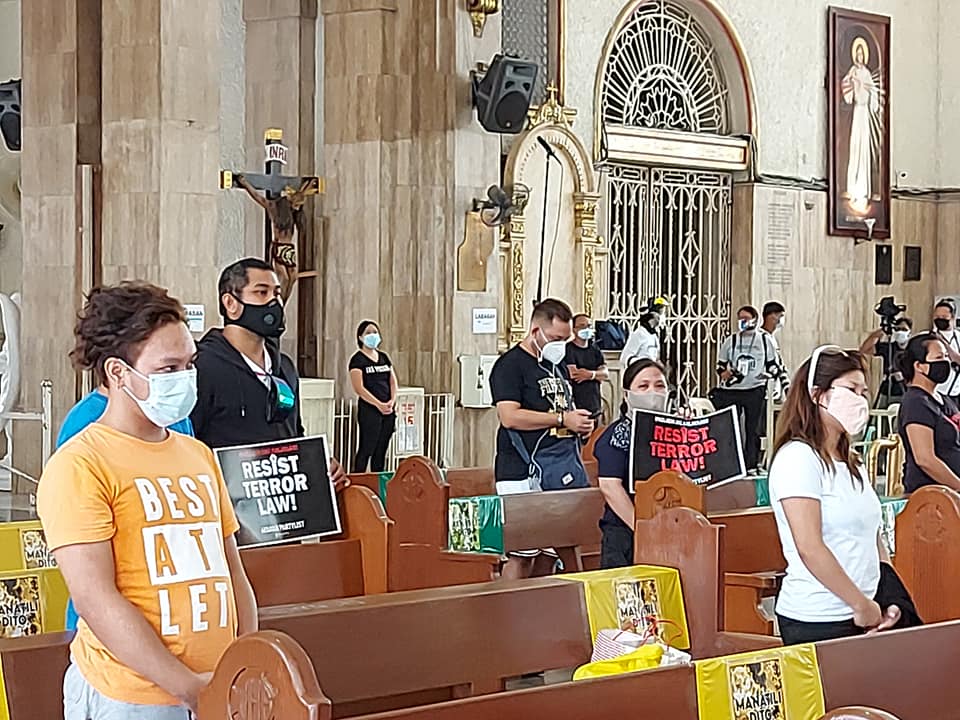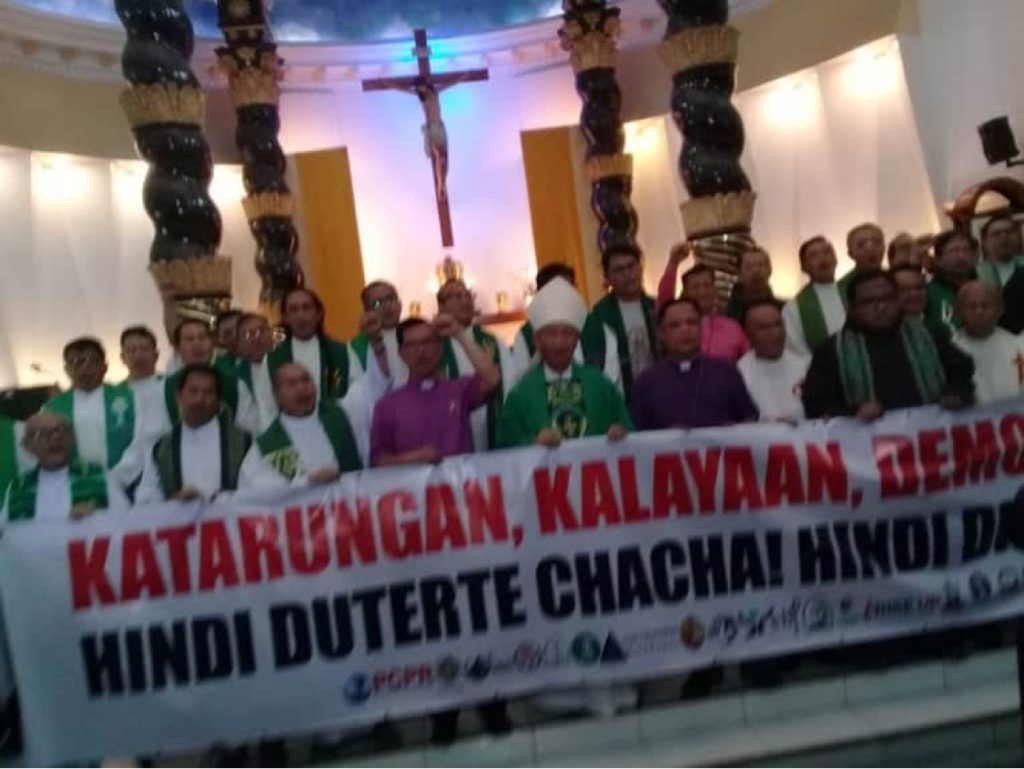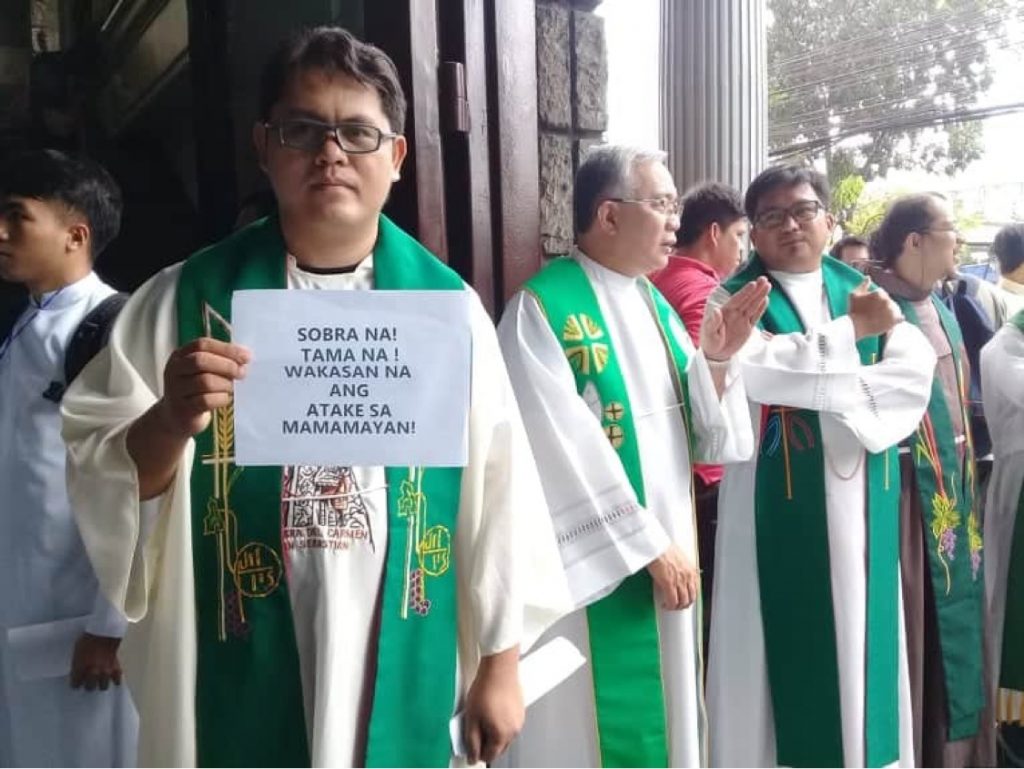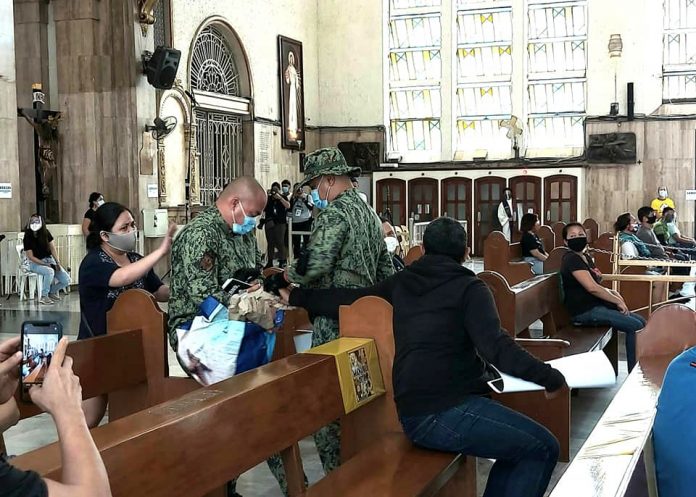Staff of the Minor Basilica of the Black Nazarene in Manila’s Quiapo district erred when they went straight to the police to complain against Akbayan activists who flashed protest signs during the “Mass for Justice and Peace” on July 27.
Father Douglas Badong, parochial vicar of the Minor Basilica, confirmed the police statement that the seizure of protest signs and pamphlets from the activists was at the request of church personnel.
In a telephone interview with LiCAS.news, Father Badong said the staff and security personnel of the church approached police officers to complain about the display of protest signs and the distribution of pamphlets by an activist to churchgoers.
Father Badong defended the police action, saying they first tried to ask a pair of activists to put down the protest signs that read “Resist Terror Law.”
The priest said he was not aware of the incident as it happened, adding that the activists gave up most of their paraphernalia.
Father Badong said that when confronted by the police, the activists replied in Filipino, “Why, is there a ban on this?”
Police took that as resistance to their authority and immediately seized the protest materials.

‘Fake news’
A statement by Akbayan Citizens’ Action Party said they would file a complaint with the Commission on Human Rights over the incident.
Akbayan said their members joined the “People’s Prayer for Justice and Peace” at Quiapo Church.
“They brought with them placards to be used for a protest elsewhere; this was kept in ‘ecobags’ and brought inside the church because there was nowhere else to place them,” read the statement.
“Police suddenly approached to confiscate the materials, but they gave no notice or reason. In frustration, members showed two remaining placards after the altercation,” it added.
The political party maintained that their members did not show the placards or disrupt the Mass before they were forcibly taken.
“Pictures of them holding the placards were taken after the altercation. The police is giving fake news,” read the group’s statement.
Akbayan claimed that the police violated the constitutional right to security of person and effects to unreasonable seizure.
The group’s statement was, however, contradicted by Father Badong who said church personnel had investigated the incident, including a check on the church’s CCTV cameras.
‘A proper time’ for protests
Father Badong insisted activists were wrong to hold up the protest signs. He said they were showing off to media who were allowed to cover the Mass.
Asked why expressing opposition to the anti-terror law was wrong when it was consistent with the stand of the Catholic Bishops’ Conference of the Philippines, Father Badong said, “for us, it is not proper.”
“There is a proper time and venue for protests,” he said, adding that the celebration of the Mass is sacred and the focus should be on the sacrament.
He said other interests and goals should be advanced outside the Church.

The priest acknowledged he did not go over the rules of conduct with the organizing group, which also included some members of the clergy and other faith-based organizations.
The Mass’ original venue was the Manila Cathedral, but was moved to the church in Quiapo after Bishop Broderick Pabillo was found to have the new coronavirus disease.
Father Badong seemed surprised when told that several Catholic Masses, including ones with bishops as co-celebrants, have featured protest symbols as part of the celebration.
The Mass at St. Peter’s church in Quezon City that preceded the president’s State of the Nation Address in 2018 had an array of priests and bishops walking in amid a big crowd, most of whom were holding up signs of protest.
Part of the offertory kit were symbols calling for a stop to the drug-related killings in the country. Several members of the clergy even posed by the altar after Mass with a huge protest streamer.
The feisty Bishop Pabillo, who would have joined the protest rallies this year, was a co-celebrant in that Mass.

Dangerous precedent
Some Catholic clergy expressed concern of a dangerous precedent. They said the videos of policemen yanking at the protesters’ properties could send a wrong message about the Church.
“The Church’s prophetic role allows the faithful to express in unity with the message of the gospel of Christ and the homily,” said Father Gilbert Billena of the San Isidro Labrador parish in Quezon City.
“This was a Mass for Justice and Peace and those signs reflected the message of Bishop Pabillo,” said the priest.
Part of the message of the Catholic bishops’ conference and Bishop Pabillo were warnings of increasing repression of the right to free expression.
Father Billena, however, also stressed the need to adjust to what administrators of churches say about conduct, as timing protest displays should add to the meaning of the sacrament.
Communication is key in holding these themed Masses, he said.
While sticking to his more conservative views on the conduct of the Mass, Father Badong acknowledged they could have managed the problem better.
“Our error was probably in going directly to the police. We should have gone to the organizers, or maybe to one of the priests with our concerns,” he told LiCAS.news.
The incident did not seem to faze the protesters, with one raising a new protest poster right after the police left.









